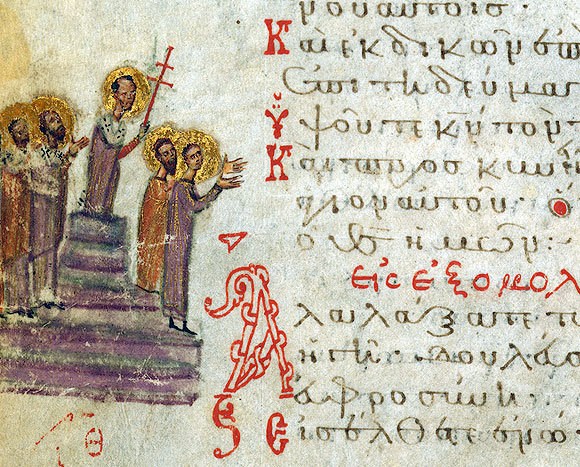The Theology of Gender – 8. St. John Chrysostom (Sofia Matzarioti-Kostara)
6 Απριλίου 2017
The whole series can be read here: The Theology of Gender
Throughout the history of Christianity many voices from the Church rose to protest the established order of society. It is obvious in the patristic writings that the Fathers[1] many times tried to defend the equality of man and woman, demonstrating that discrimination was a problem at all ages. St. Gregory the Theologian, in a revolutionary way, expressed his disapproval to the discriminatory laws against women, saying: “men were the lawmakers, therefore the legislation was against women.”[2] Theodoretus of Cyrus, in the fifth century, stressed the inequality with which the human law treats transgressions of men and women: «for human law compels women to prudent behavior and punishes them when they transgress the law, whereas the same prudence is not required of men, for men were those who set forth the law, but they did not provide for equality».[3]

St. John Chrysostom, an open-minded pastoral teacher, respected women, contrary to contemporary customs, and condemned the sexual misconduct of men that was generally acceptable at the time.[4] Rejecting the beliefs of his society, Chrysostom gave adultery a broader definition, according to the ethos of Christian teachings.[5] As many other Fathers of the Church, he considered any extramarital sexual relationship to be adulterous, whether committed by men or women. He took his definition one step further and condemned even the adulterous intensions and thoughts of men desiring women other than their lawful spouse.[6] Chrysostom encouraged men to disregard the model of man promoted by society, and advised them not to divorce their wives, imperfect as they might be, but to show patience and kindness towards them. Christian men were urged by their pastor to exceed all worldly standards and adopt a new model of life, abandoning the privileges society granted them. These words are striking even in our modern world, where patience is a rare virtue whether it be for men or women. As Chrysostom explained, divorce causes many problems, since a man who divorces his wife will be guilty of adultery if he gets into a relationship with another woman.[7]
Although Christian teaching throughout the Byzantine era and even during the Turkish occupation[8] defended the equality of men and women, Canon Law seems to be inconsistent with this spirit, especially in the canonical work of St. Basil. In our attempt to discern and point out the place of women in the canonical legislation, we have to first acknowledge that Church’s law has a different orientation and principles than civil law. The main difference is that the Church legislates not for the protection of the rights of the people, as is the case with the civil law, but to help the faithful to progress spiritually. Accordingly, while the state emphasized the men’s role in family and society and tried to protect their rights, the Church stressed the role of women as having a greater impact on the spirituality of the family and legislated with this purpose in mind. The same principle applied to the priests, who were expected to have higher moral standards given the great influence they have on the ethos of the Christians in their community, and therefore they were penalized more strictly.
[1]St. Ignatius, St. Athanasius the Great, St. Basil, and others.
[2] «ἂνδρες ἦσαν οἱ νομοθετοῦντες, διά τοῦτο κατά γυναικῶν ἡ νομοθεσία», Λόγος 37,6 PG 36, 289 (translated by the author).
[3] «Οἱ μέν γάρ ἀνθρώπινοι νόμοι ταῖς γυναιξί διαγορεύουσι σωφρονεῖν, καί κολάζουσι παραβαινούσας τόν νόμον΄ τούς δέ γε ἂνδρας τήν ἲσην σωφροσύνην οὐκ ἀπαιτοῦσιν. Ἂνδρες γάρ ὂντες οἱ τεθεικότες τούς νόμους, τῆς ἰσότητος οὐκ ἐφρόντισαν» Θεοδωρήτου Κύρου, “Ἑρμηνεία εἰς τήν Α΄ προς Κορινθίους Ἐπιστολήν,” PG 82, 272B-272C (translated by the author).
[4] «…Ὃταν τοίνυν ἲδης πόρνην δελεάζουσαν, ἐπιβουλεύουσαν, ἐρῶσαν τοῦ σώματος, εἰπέ πρός αὐτήν΄Οὐκ ἒστιν ἐμόν τό σῶμα, τῆς γυναικός ἐστι τῆς ἐμῆς΄οὐ τολμῶ καταχρήσασθαι, οὒτε ἑτέρα τοῦτο ἐνδοῦναι γυναικί. Τοῦτο καί γυνή ποιείτω. Πολλή γάρ ἐνταῦθα ἡ ἰσοτιμία΄καίτοι γε ἐν τοῖς ἂλλοις πολλήν δίδωσιν ὑπεροχήν ὁ Παῦλος», Ἰωάννου Χρυσοστόμου, PG 51, 214.
[5] «Μοιχεία δέ οὐ μόνον τό ἑτέρῳ συνεζευγμένην μοιχᾶσθαι, ἀλλά καί τό δεδεμένον αὐτόν γυναικί», “Α΄ Θεσσαλονικεῖς,” PG 62, 425 and «Πολλοί μοιχείαν νομίζουσι, ὃταν τις μόνον ὓπανδρον φθείρῃ γυναῖκα. Ἐγώ δέ κἂν δημοσίᾳ πόρνῃ, μοιχείαν τό τοιοῦτον εἶναί φημι», “Διά δέ τάς πορνείας…” PG 51, 213.
[6] «Καί ἐκεῖνο μοιχείας ἓτερον εἶδος, τόν γυναῖκα ἒχοντα ἒνδον, πόρναις γυναιξίν ὁμιλεῖν», “Γυνή δέδεται νόμῳ…” PG 51, 222, and «Ῥίζα μοιχείας, ἐπιθυμία ἀκόλαστος. Διό οὐ μοιχείαν κολάζει μόνον, ἀλλά καί ἐπιθυμίαν τήν τῆς μοιχείας μητέρα» “Περί Μετανοίας,” PG 49, 316, and «Ὁ ἐμβλέψας γυναῖκα πρός τό ἐπιθυμῆσαι αὐτῆς, ἢδη ἐμοίχευσεν αὐτήν ἐν τῇ καρδίᾳ αὐτοῦ», “Περί Μετανοίας,” PG 49, 321.
[7] «Κἂν μυρία ἐλαττώματα ἒχη, φέρε γενναίως. Οἶδα ὃσων ἀγαθῶν αἲτιόν ἐστι, τό γυναῖκα πρός ἂνδρα μή διχοστατεῖν. Οἶδα ὃσων κακῶν ἐστιν ὑπόθεσις, ὃταν οὗτοι πρός ἑαυτούς διαστασιάζωσιν. Ἐλαττώματα ἒχει ἡ γυνή; δεήθητι τοῦ Θεοῦ. Ἂν δέ ἀδιόρθωτος μένῃ, σύ τόν μισθόν οὐκ ἀπώλεσας τῆς ὑπομονῆς. Ἐάν δέ ἐκβάλῃς, ἓν πρῶτον ἣμαρτες, τό παραβῆναι τόν νόμον καί μοιχός κρίνεσθαι παρά τῷ Θεῷ», “Περί τοῦ μή ἀπογινώσκειν..” PG 51, 369-370.
[8] See the teachings of Saint Kosmas the Aitolian. J. Menounos, Κοσμά του Αιτωλού Διδαχές και Βιογραφία, 6η έκδοση, (Αθήνα, 2002).
The whole series can be read here: The Theology of Gender





